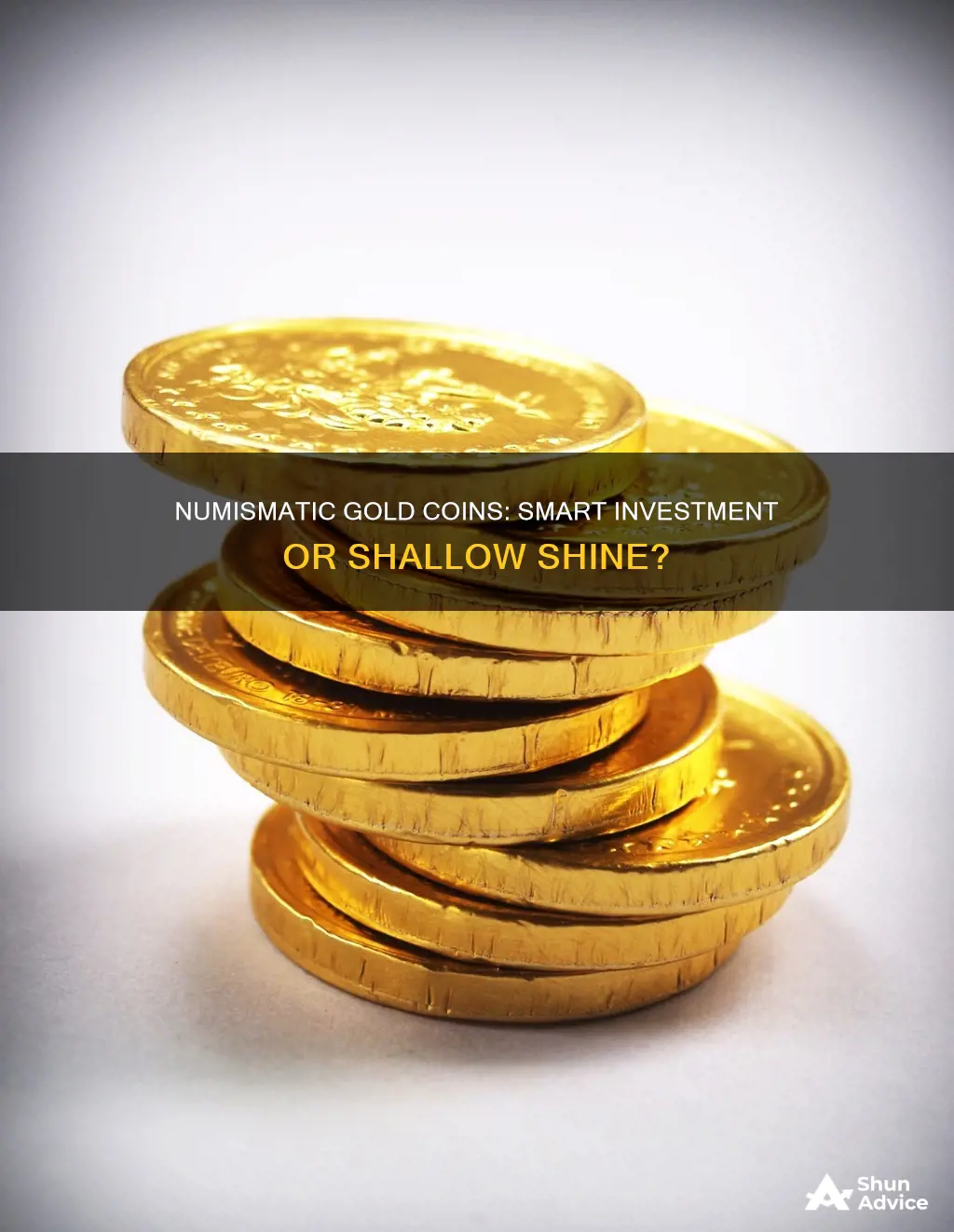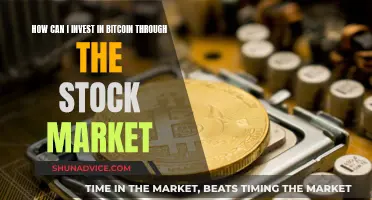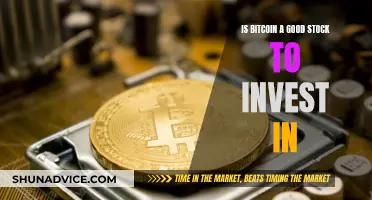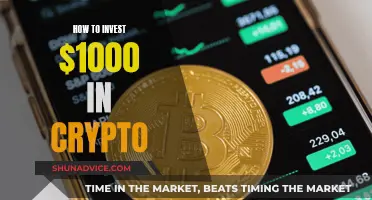
Numismatics, or the study of coins, is a fun hobby for many, but is it a good investment? Numismatic coins are essentially rare or valuable coins that have an external value above and beyond the base value of the precious metal. The market for these coins is complex, illiquid, and involves a steep learning curve. Novice investors have lost money in this market, even when the price of gold has risen. This is because the value of a rare coin is largely subjective and based on factors such as rarity, condition, historical significance, and demand. The market for these coins is also tiny, making it difficult to find a buyer when it's time to sell. On the other hand, investing in bullion coins is straightforward, liquid, and easy to grasp. So, is investing in numismatic gold coins a good idea? The answer depends on your level of expertise and your motivation for investing.
| Characteristics | Values |
|---|---|
| Definition | Rare or valuable coins with an external value exceeding that of the precious metals they contain |
| Investment Type | Tangible asset, commodity-like investment |
| Pros | Diversifies your portfolio, reduces risk, can be a fun hobby, can be a good investment if you do your research |
| Cons | Subjective value, steep learning curve, illiquid market, high risk of overpaying, difficult to sell |
| Best Practice | Buy bullion for business, numismatics for fun; only invest if you truly enjoy the education, research, and process |
What You'll Learn
- The market for numismatic gold coins is complex, illiquid, and challenging to navigate
- Numismatic coins are often valued subjectively, making them a risky investment
- Numismatic coins are more expensive than bullion coins due to higher premiums
- Numismatic coins are not allowed in retirement accounts, indicating they are not considered a safe investment
- Numismatic coins are more vulnerable to fraud and deceptive marketing

The market for numismatic gold coins is complex, illiquid, and challenging to navigate
The numismatic market is also relatively illiquid compared to the bullion market. This means that finding buyers or sellers at a desired price can be challenging. The numismatic market is highly specialized, with seventy different quality grades that can be assigned to a single coin. This makes it difficult for novice investors to navigate and increases the risk of overpaying or selling at a loss.
Additionally, the numismatic market is prone to deceptive marketing and scams. Some sellers may overstate the value of their coins or charge excessive premiums, leading to losses for investors. It is crucial for investors to conduct extensive research and due diligence to avoid falling victim to these practices.
Furthermore, the resale market for numismatic coins can be challenging. The value of a coin can depend on its rarity, condition, and demand, which can change over time. As a result, investors may need to hold onto their coins for an extended period before finding a buyer willing to pay their desired price.
Overall, the market for numismatic gold coins is complex and challenging to navigate. Investors interested in this market should proceed with caution and conduct thorough research to avoid potential pitfalls.
The Cost of Bitcoin Mining: How Much to Invest?
You may want to see also

Numismatic coins are often valued subjectively, making them a risky investment
The premium for a numismatic coin is based on its rarity, condition, historical significance, and demand. However, different people value these aspects differently, leading to subjective valuations. While there are annual publications that list prices for numismatic coins, these prices often do not reflect the actual selling price. This subjectivity in valuation can make it difficult for investors to predict the future value of numismatic coins and can lead to overpaying for coins that do not increase in value.
Additionally, the numismatic coin market is relatively small and illiquid compared to the bullion market. This can make it challenging to find willing buyers or sellers at desired prices, further contributing to the riskiness of investing in numismatic coins.
Furthermore, the numismatic market is complex and involves a steep learning curve. Investors need to have a good understanding of the market and the various factors that influence coin values to make informed investment decisions. Without this knowledge, investors may be vulnerable to deceptive marketing and overpriced coins.
In contrast, bullion coins derive their value primarily from the type and weight of the metal they contain, making their valuation more straightforward and transparent. Bullion coins are also widely recognized and highly liquid, making it easier to find buyers and sellers at fair, universally recognized prices.
While investing in numismatic coins can be profitable, it is important to approach it with caution due to the subjective nature of valuations and the complexities of the market. Investors should thoroughly research the market and understand the risks involved before considering numismatic coins as an investment option.
The Ultimate Guide to Investing in Bitcoin
You may want to see also

Numismatic coins are more expensive than bullion coins due to higher premiums
Numismatic coins are often much older and made of various metals and components, giving them a lower melt value than bullion coins. This means that they are worth less when melted than in coin form. However, numismatic coins can have a numismatic or collector's value that is many times the value of the precious metal content of the coin. This is because the premium for a numismatic coin is based on rarity, condition, historical significance, and demand. For example, a 1907 $20 St. Gaudens, High Relief Double Eagle gold coin, produced by the Philadelphia Mint, can be worth 500 times the spot price of gold. According to the Numismatic Guaranty Corporation (NGC), the estimated selling price for this rare coin with a numerical grade of 69 is $685,000.
The value of numismatic coins is largely subjective and based on difficult-to-quantify, ever-changing metrics such as demand for that particular coin, market timing, coin condition and rarity, age, country of origin, and method of auctioning. This means that their price is wholly derived from attributes far more complicated than the basic metal content of the coin. As a result, numismatic coins are often more expensive than bullion coins due to higher premiums.
The market for numismatic coins is also much smaller than the market for bullion coins, which can make it difficult to find a willing buyer at a fair price. The numismatic market is also highly illiquid, with a steep learning curve, making it challenging for investors to buy and sell coins. Additionally, the numismatic market is prone to deceptive marketing and scams, with sellers charging obscene premiums that can guarantee losses for buyers.
In contrast, bullion coins have a straightforward value proposition based on the type and weight of the metal. They are widely recognized and highly liquid, making it easy for investors to resell at fair, universally recognized prices.
The Dark Side of Bitcoin: Is It Worth the Risk?
You may want to see also

Numismatic coins are not allowed in retirement accounts, indicating they are not considered a safe investment
Numismatic coins, or gold coins that are rare or valuable, are not a good investment for retirement accounts. The Internal Revenue Service (IRS) deems numismatic coins as collectibles, which are not eligible for a Gold IRA. This indicates that numismatic coins are not considered a safe investment option.
The IRS has set stringent criteria for gold coins to be eligible for inclusion in retirement accounts, such as a Self-Directed Individual Retirement Account (IRA) or Gold IRA. These criteria include factors such as the coin's composition, purity, and adherence to other IRS rules governing Gold IRAs. Numismatic coins, due to their rarity and high premiums, do not meet these requirements.
The high premiums on numismatic coins are a result of their rarity and subjective value. The premium for a numismatic coin is based on factors such as rarity, condition, historical significance, and demand. However, the demand for numismatic coins is relatively low compared to standard bullion coins, which can make it difficult to sell them and retrieve a good price.
Additionally, there is a risk of overpaying for numismatic coins due to the subjective nature of their valuation. Investors may lose money even when the price of gold rises if the demand for their specific coins is low. It is also important to have a thorough understanding of the numismatic coin market to make sound investments, which can be time-consuming and challenging.
Therefore, numismatic coins are not allowed in retirement accounts, indicating that they are not considered a safe investment option. Investors should carefully consider the risks associated with investing in numismatic coins and seek alternative options, such as bullion coins and bars, for their retirement portfolios.
Smart Bitcoin Investment: How Much to Invest?
You may want to see also

Numismatic coins are more vulnerable to fraud and deceptive marketing
Numismatic coins are highly vulnerable to fraud and deceptive marketing. The market for numismatic coins is complex, illiquid, and challenging to navigate. It involves a steep learning curve, and investors can easily be taken advantage of by unscrupulous dealers.
The value of numismatic coins is largely subjective and based on intangible factors such as rarity, demand, condition, historical significance, and age. This makes it easy for dealers to overstate the value of a coin and charge high premiums. The high premiums on numismatic coins also make it difficult for investors to turn a profit, as the value of the coin needs to appreciate significantly just to break even.
Additionally, the numismatic market is tiny compared to the bullion market, making it difficult to find willing buyers or sellers at fair prices. The lack of liquidity in the numismatic market further increases the risk of fraud and deceptive marketing.
To avoid being scammed when investing in numismatic coins, it is crucial to do extensive research and understand the rare coin market. Investors should also seek out trusted and reputable dealers and get second opinions on the value of coins.
The Ultimate Guide to Cryptocurrency Coin Price Investing
You may want to see also







